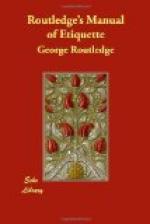A wife should also receive a stated allowance for dress, within which limit she ought always to restrict her expenses. Any excess of expenditure under this head should be left to the considerate kindness of her husband to concede. Nothing is more contemptible than for a woman to have perpetually to ask her husband for small sums for housekeeping expenses—nothing more annoying and humiliating than to have to apply to him always for money for her own private use—nothing more disgusting than to see a man “mollycoddling” about marketing, and rummaging about for cheap articles of all kinds.
Let the husband beware, when things go wrong with him in business affairs, of venting his bitter feelings of disappointment and despair in the presence of his wife and family,—feelings which, while abroad, he finds it practicable to restrain. It is as unjust as it is impolitic to indulge in such a habit.
A wife having married the man she loves above all others, must be expected in her turn to pay some court to him. Before marriage she has, doubtless, been made his idol. Every moment he could spare, and perhaps many more than he could properly so appropriate, have been devoted to her. How anxiously has he not revolved in his mind his worldly chances of making her happy! How often has he not had to reflect, before he made the proposal of marriage, whether he should be acting dishonourably towards her by incurring the risk, for the selfish motive of his own gratification, of placing her in a worse position than the one she occupied at home! And still more than this, he must have had to consider with anxiety the probability of having to provide for an increasing family, with all its concomitant expenses.
We say, then, that being married, and the honeymoon over, the husband must necessarily return to his usual occupations, which will, in all probability, engage the greater part of his thoughts, for he will now be desirous to have it in his power to procure various little indulgences for his wife’s sake which he never would have dreamed of for his own. He comes to his home weary and fatigued; his young wife has had but her pleasures to gratify, or the quiet routine of her domestic duties to attend to, while he has been toiling through the day to enable her to gratify these pleasures and to fulfil these duties. Let then, the dear, tired husband, at the close of his daily labours, be made welcome by the endearments of his loving spouse—let him be free from the care of having to satisfy the caprices of a petted wife. Let her now take her turn in paying those many little love-begotten attentions which married men look for to soothe them—let her reciprocate that devotion to herself, which, from the early hours of their love, he cherished for her, by her ever-ready endeavours to make him happy and his home attractive.
In the presence of other persons, however, married people should refrain from fulsome expressions of endearment to each other, the use of which, although a common practice, is really a mark of bad taste. It is desirable also to caution them against adopting the too prevalent vulgarism of calling each other, or indeed any person whatever, merely by the initial letter of their surname.




